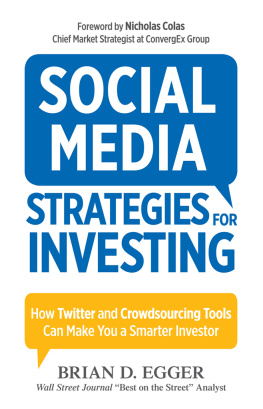My thanks to those who took time out of their crazed schedules to candidly discuss their lives, the intricacies of Wall Street, and the workings of the financial press. Im indebted to Paul Golob, my friend and editor, who always sees the big picture and has provided crucial intellectual guidance on all my books. Im grateful as well to my agent, Rafe Sagalyn, for his savvy advice and deft touch in bringing my work to a wider audience. Above all, special thanks goes to my family for their support, and to Judy and Bonnie for occasionally letting me use the computer.
INTRODUCTION
At 2:15 P.M. on Friday, March 17, 2000, a little-known reporter blew a sizable hole in the stock of a high-flying, high-tech outfit called the Xybernaut Corporation.
The company, which makes miniature computers that can be worn as accessories, had been on an incredible tear, the likes of which had somehow become breathtakingly routine in the dizzying atmosphere of Wall Street. Its stock, which had been selling for $1.31 a share the previous October, had hit nearly $30 two weeks earliera more than twenty-fold increase for a firm with just eighty full-time employeesbefore settling back to $23 a share.
But the situation changed dramatically when David Evans, a reporter in the Los Angeles bureau of the Bloomberg News service, got online to examine Xybernauts filing that morning with the Securities and Exchange Commission. Evans found some troubling language that he quickly filed in a terse report for the Bloomberg financial wire.
Xybernaut Corp.s auditor warned theres substantial doubt about the maker of wearable computer systems ability to continue as a going concern, citing its continuing losses and need for more capital, the story began.
Xybernaut stock dropped precipitously until the markets 4:00 P.M. closing bell, and again in after-hours trading, to 14 15/16. In the space of a few short hours, the company, based in Fairfax, Virginia, had lost more than a third of its market value. The power of a single journalist to puncture the helium balloon of soaring stock prices had never been greater. But the lightning speed of modern technology also gave corporate executives the tools to fight back.
John Moynahan, Xybernauts chief financial officer, was on vacation in Florida and had turned off his cell phone about fifteen minutes before the Bloomberg report hit. He was extremely upset when he belatedly learned of the story. The warning by the companys accounting firm was, in Moynahans view, mere legal boilerplate. The company had included it in every one of its SEC statements since going public in 1996, and raising the needed cash had never been a problem. The reporter had simply put the most alarmist spin on the story, describing Xybernaut as though it were in dire financial straits. Moynahan also thought the timing of the article, late on a Friday, was suspicious, and wondered whether investors who had shorted the stockbetting that its price would declinehad something to do with the story.
At 9:40 on Saturday morning, Moynahan opened his laptop and signed onto a message board on Yahoo!s Website that was devoted entirely to Xybernaut. Moynahan had founded the club, which had nine hundred members and drew as many as eleven thousand page views a day, and served as the sites moderator. He quickly planted his flag in that stretch of cyberspace, declaring that in my six years with Xybernaut, the future for the company and its shareholders has never been brighter than it is today.
Many club members, who actively traded the stock, were sympathetic. The Bloomberg piece was a hit job, more or less, one person said.
The article and the timing smelled very fishy! said another.
Moynahan spent the rest of the day helping the company draft a press release assailing the Bloomberg piece. A company attorney had already complained to Bloomberg executives, who stood by the story. On Monday morning, Xybernaut said in its statement that the plunge in the stock price was based on reaction to an article released late Friday afternoon and was not based on any fundamental change in our operations.... The article did not accurately nor fairly describe our current position... or our future opportunities.
David Evans was unperturbed by the conspiracy theories, since no one had prompted him to check the SEC filing. This was what he did for a living, digging out the fine print that companies declined to put in their press releases. Evans was accustomed to being deluged with angry e-mail from investors who blamed him when their stocks tanked, who viewed him as the evil messenger. But he was simply using government documents to tell the full story.
On Tuesday morning, March 21, company executives issued another release that would prove even more important. Xybernaut said that the company and its products would be featured that evening on CNBC, the business network that carried immense clout with investors. The mere announcement of the upcoming segment helped boost Xybernauts stock 24 percent, to just over $21 a share, or slightly below where it had been when the Bloomberg piece hit the wires.
At 5:39 P.M., Evans moved another damaging story on the Bloomberg wire. Weeks earlier, Xybernaut had trumpeted a buy rating on its stock from a research firm called Access 1 Financial, which had predicted that the price would double within six months. Indeed, the price doubled within a month. What the company did not disclose, Evans had found, was that Mark Bergman, the president and founder of Access 1 Financial, was a former Xybernaut executive who still owned options to buy shares in the company.
But Evanss report was immediately overshadowed. At 6:21, CNBC anchor Bill Griffeth introduced the segment on Xybernaut by saying: You can wear just about everything else, why not your computer? It turns out that you can.... A small company called Xybernaut has already made big strides in the hands-off computer sector. The story was punctuated by upbeat comments from Moynahan, and reporter Mike Hegedus posed in the studio with a computer attached to his belt and a futuristic-looking headset that enabled him to see the monitor by peering into a small mirror dangling before his right eye. Shortly after 7:00 P.M., CNBCs Business Center reported that Xybernaut stock had gained another dollar in after-hours trading. In the space of five days, the companys stock had been decimated and then magically revived, thanks to the media power-brokers who wielded such enormous influence on Wall Street.
When journalists cover politics, their outsider role is clearly defined. No single reporter can affect White House policies or a candidates campaign through mere analysis or commentary. True, if several news organizations pound away in unison, they can put an issue on the national agenda or throw a politician on the defensive. But such efforts can be measured only roughly, through the fleeting snapshot of opinion polls. Much of the public distrusts the press, muting the impact of a concerted editorial attack on the president or other national figures. In this realm, journalists are scorekeepers and second-guessers and naysayers, and their influence is ephemeral and diffuse.







